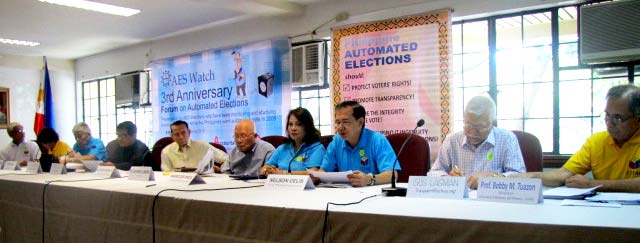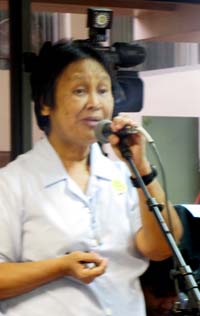AES Watch gives failing rate to Comelec’s poll preparations
CenPEG.org
February 19, 2013
To mark its third anniversary on Feb. 18 this year, the Automated Election System Watch (AES Watch) released its STAR Card rating of the Commission on Elections’ (Comelec) election preparations with a 0.29 failure grade.
--------
To mark its third anniversary on Feb. 18 this year, the Automated Election System Watch (AES Watch) released its STAR Card rating of the Commission on Elections’ (Comelec) election preparations with a 0.29 failure.
AES Watch’s committee of IT practitioners, programming and security experts as well as academics in mathematics, business, and public management, gave the failing grade based on System Transparency, Accountability, and Reliability (STAR). The rating was made after a series of committee workshops and based on documentation collated from the election watchdog’s dialogs with Comelec, Congress hearings, monitoring of the poll administrator’s election preparations, the automated election law (RA 9359) and e-commerce act,, and other references.
The STAR Card rating was discussed by Nelson Celis, AES Watch co-convener and former president of the Philippine Computer Society (PCS), during an anniversary forum held at the UPAA Boardroom, Bahay ng Alumni, University of the Philippines in Diliman, Quezon City. The forum was covered by the press.
This is the second STAR Card rating to be issued by AES Watch. The first rating was made during the May 2010 first nationwide automated elections with three releases from late 2009 to April 2010. The rating then was “in danger.”
The second STAR Card lists 27 items of concerns guided by the following key requirements: 1) System set-up (will the AES be ready for full implementation?); 2) Internal security (will the AES have the necessary safeguards to prevent fraud?); 3) Personnel training and voters’ education (will the teachers and the voters know exactly what to do on election day?); and 4) Contingency planning (will Comelec and other involved personnel know what to do when things go wrong?)
The items of concerns were rated as: PASS (4 points), QUALIFIED PASS (3), WARNING (2); DANGER (1); and FAIL (0).
In a related Statement of Concern, “Comelec must stop committing the same mistakes; voters’ rights are at stake,” AES Watch also raised its concern over the poll body’s failure to establish public trust and confidence. The statement, read by Maricor Akol of TransparentElections.org, stated in part:
“The same problems of ballot rejections, transmission failures, inaccuracy of the vote count, Election Returns and Certificates of Canvass not digitally signed as required by law, and many other problems and issues observed in the May 10, 2010 National and Local Elections unfolded during the mock elections conducted before the Committee on Suffrage and Electoral Reforms at the House of Representatives last July 24-25, 2012 and in ten selected cities/municipalities last February 2, 2013. The same problems and issues, regarded by Comelec as minor glitches, are highly likely to resurface during the Midterm Elections which could result in inaccurate vote counts and tallies and disenfranchisement of voters.”
AES Watch also asked: “Is the repeated failure to comply with the automation law and the fixation to use the defective Smartmatic-provided system setting the stage for a possible election failure? If this is so, the Comelec has nobody to blame but itself for what are potentially impeachable offenses. It should stop pointing the finger at the usual suspected culprits like the teachers, poll watchdogs, and the voters themselves.”
Evita L. Jimenez, executive director of CenPEG, announced the election watchdog’s campaign on voter education and poll watch training. She also presented the “10 Alerts” on poll watching.
Engr. Gus Lagman, former IT Commissioner of Comelec, asked the Comelec to issue its contingency plans now in the light of the flawed election technology. He questioned Comelec’s decision to junk the canvassing and consolidating system (CCS) that its IT department developed in 2012 at a cheap budget of P600,000 compared with the Smartmatic 2010 CCS, P60 million.
Sr. Gloria Carmen of Biliran Kawsa shared her group’s investigation and findings of electronic fraud in Biliran during the May 2010 elections, citing in particular the failure of the technology provider, Smartmatic, in bringing about credible and fraud-free election system in the island province of Biliran.
CenPEG IT Fellow Pablo Manalastas underscored the importance of a source code and its review by political parties and other interested groups in accordance with law.
But Atty. Ryan S. Quilala, Senate legal staff, confirmed AES Watch’s position on the absence of a source code review, a legal requirement of the election law. He said that the political party, PDP Laban, went to the Comelec office early January this year to conduct a source code review. The party’s IT-legal team was told that no source code was available for the review.
Benjamin Valbuena, president of ACT-Philippines, lamented how scheduled dialogs with Comelec have been postponed several times by Comelec chairman Sixto Brillantes.
Fr. Joe Dizon of Kontra Daya said Comelec will be held accountable for its failure to perform its constitutional duty particularly ensuring a credible and trustworthy election system. He also cited President Benigno S. Aquino III’s silence on the controversies hounding the election automation.
The AES Watch panel was headed by former Vice President and AES Watch Chair Emeritus Teofisto Guingona, Jr. and CenPEG Board Chair and National Artist Bienvenido Lumbera. Both Guingona and Lumbera also received copies of the CenPEG observation report on the U.S. presidential election last Nov. 6, 2012. The observers’ team was led by Evita L. Jimenez, Pablo Manalastas, and Bobby Tuazon.

AES Watch STAR Card (index photo): Nelson Celis (3rd from right) explains the STAR Card. (L-R) Dr. Pablo Manalastas, Evi Jimenez (CenPEG executive director), Fr. Joe Dizon (Kontra Daya), Fr. Rex Reyes (NCCP general secretary), former Vice President Teofisto Guingona, CenPEG chair Bien Lumbera, Maricor Akol (TransparentElections.org), Gus Lagman (former Comelec commissioner), and Bobby Tuazon. CenPEG photo

SR GLORIA CARMEN: Kawsa's Sr. Gloria Carmen narrates the 2010 Biliran electronic fraud case. CenPEG photo
Launched on Jan. 18, 2010, the citizens’ election watch group Automated Election System Watch (AES Watch) is composed of more than 40 organizations, among them, the University of the Philippines Alumni Association (UPAA), CBCP-Nassa, Center for People Empowerment in Governance (CenPEG), Philippine Computer Society (PCS) Foundation, TransparentElections.org, Computer Professionals Union, Caucus of DLSU-CCS, Association of Major Religious Superiors of the Philippines (AMRSP), National Union of Students of the Philippines (NUSP), Transparency International-Philippines, National Council of Churches in the Philippines (NCCP), Faculty of Ateneo de Manila Dept. of Information Communications System, UP Dept. of Computer Science and ITTC, Philippine Computer Emergency Response, Movement for Good Governance, Concerned Citizens Movement, Dilaab-Hearts Foundation, Solidarity Philippines, Association of Schools of Public Administration in the Philippines (ASPAP), Sisters Association in Mindanao (SAMIN), Computing Society of the Philippines (CSP), Pagbabago (Movement for Social Change), Alyansa Agrikultura, Ecumenical Bishops Forum, Health Alliance for Democracy, and others. Its President Emeritus is former Vice President Teofisto Guingona, Jr. while its first spokesperson was Alfred Pascual, now UP President. CenPEG.org
- Probing presidential platforms
- Conference calls for people-centered policy actions for Asian development and peace
- WWII 'comfort women' urge visiting Japanese emperor: OFFICIAL GOV’T APOLOGY, UPHOLD TRUTH, and JUST COMPENSATION
- FEARLESS FORECAST (EPISODE II): Comelec will not comply with e-Commerce Law in 2016 elections
- Fearless forecast: Comelec’s non-compliance with the AES law in 2016 (last of 2 parts)
- Fearless forecast: Comelec will not comply with the AES law in 2016
- CenPEG releases travelogue
- Experts: Nuisance bets reflect disillusionment, uneven playing field
- Partylist solon presses for tax cuts
- The True Cost of a Political Campaign
- Management decisions: Based on RA 9369 or purely Comelec’s?
- CenPEG holds 1st roundtable with media on presidential poll results
- Filipino IT can do it!
- FIT4E: The only transparent solution
- Realpolitik in the maritime tiff
- China’s challenge to PH sovereignty
- Choosing the next president
- Fixing the presidency, reforming the state
- New Comelec chair says he’s open to other election technologies
- SC ruling on AES Watch Pabillo and IBP vs Comelec, Smartmatic-TIM
- Comelec must explain P3.2B unliquidated cash advances
- CONGRESS ASKED TO HOLD DEMO ON PCOS HACKING
- 25 Bishops ask poll body to stop midnight deal with Smartmatic
- Pope Francis: reform and conversion
- 2 poll watch coalitions stage rally vs Comelec-Smartmatic midnight deal
- AES Watch questions Comelec-Smartmatic midnight deal
- ASEAN-India: Building Youth Partnerships through Culture and Entrepreneurship
- CenPEG forges research exchange and partnership with Jinan University
- FOI: Bearing fruit or foiled again?
- Remittance with Representation: The right to vote of overseas Filipinos
Center for People Empowewrment in Governance (CenPEG), Philippines. All rights reserved


